Awakin Democracy Circles
Awakin Democracy Circles are monthly gatherings via zoom. Seeking to tap into the wisdom of the heart, we sit in silence for 30 minutes and then have a circle of sharing prompted by a short passage or focal piece. Gatherings are 75 minutes. Focal pieces are below.
Awakin Circles, an initiative of ServiceSpace, began in a living room in Silicon Valley in 1996 with three people who came together to sit in silence, sharing, and community. There are now hundreds of Awakin Circles on a wide range of topics hosted by people worldwide. To learn more about Awakin Democracy Circles, contact: sally@uri.org
CIRCLE ONE — Granny D, You’re Never Too Old to Raise a Little Hell (excerpts)
- “Never be discouraged from being an activist because people tell you that you’ll not succeed. You have already succeeded if you are out there representing truth and justice or compassion or fairness or love. You already have your victory because you have changed the world, you have changed the status quo by you, you have changed the chemistry of things. And changes will spread from you, will be easier to happen again in others because of you, because believe it or not, you are the center of the world.”
- “It is said democracy is not something we have but something we do. But right now we cannot do it because we cannot speak. We are shouted down by the bull horns of big money. It is money with no manners for democracy, and it must be escorted from the room.”“It is said democracy is not something we have but something we do. But right now we cannot do it because we cannot speak. We are shouted down by the bull horns of big money. It is money with no manners for democracy, and it must be escorted from the room.”
- [from speech on steps of Congress after completing her trans-continental walk] “While we are here to speak frankly to our representatives, let us also speak frankly to ourselves….If we are hypnotized by television and overwrought by life on a corporate-consumer treadmill, let us snap out of it and regain our lives as free, calm, fearlessly outspoken people who have time for each other and our communities.”
- “We have a duty to look after each other. If we lose control of our government, then we lose our ability to dispense justice and human kindness. Our first priority today, then, is to defeat utterly those forces of greed and corruption that have come between us and our self-governance.”
- “There are two kinds of politics in the world: the politics of love and the politics of fear. Let us choose life and love, and happily use ourselves up in loving service to one another.”
- “In this generation the fate of our natural environment and of our democratic environment will be decided. Only great leadership and great love can get us through the times ahead. We must all take part in this great drama. It is more than politics, it is a struggle for the soul and it is exquisitely personal to each of us.”
CIRCLE TWO —The Open Space of Democracy by Terry Tempest Williams (excerpt from last chapter)
CIRCLE THREE — Across That Bridge by John Lewis (excerpts)
CIRCLE FOUR — Being in Right Relationship by Parker J. Palmer (excerpts)
CIRCLE FIVE — The Hill We Climb by Amanda Gorman
Poem recited for the Inauguration of Joe Biden, President of the United States, Jan. 20, 2021
Where can we find light in this never-ending shade?
The loss we carry,
A sea we must wade
We’ve braved the belly of the beast
We’ve learned that quiet isn’t always peace
And the norms and notionsOf what just is
Isn’t always just-ice
And yet the dawn is ours
Before we knew it
Somehow we do it
Somehow we’ve weathered and witnessed
A nation that isn’t broken
But simply unfinished
We the successors of a country and a time
Where a skinny Black girl
Descended from slaves and raised by a single mother
Can dream of becoming president
Only to find herself reciting for one
And yes we are far from polished
Far from pristine
But that doesn’t mean we are
Striving to form a union that is perfect
We are striving to forge a union with purpose
To compose a country committed to all cultures, colors, characters and
Conditions of man
And so we lift our gazes not to what stands between us
But what stands before us
We close the divide because we know, to put our future first,
We must first put our differences aside
We lay down our arms
So we can reach out our arms
To one another
We seek harm to none and harmony for all
Let the globe, if nothing else, say this is true:
That even as we grieved, we grew
That even as we hurt, we hoped
That even as we tired, we tried
That we’ll forever be tied together, victorious
Not because we will never again know defeat
But because we will never again sow division
Scripture tells us to envision
That everyone shall sit under their own vine and fig tree
And no one shall make them afraid
If we’re to live up to our own time
Then victory won’t lie in the blade
But in all the bridges we’ve made
That is the promise to glade
The hill we climb
If only we dare
It’s because being American is more than a pride we inherit,
It’s the past we step into
And how we repair it
We’ve seen a force that would shatter our nation
Rather than share it
Would destroy our country if it meant delaying democracy
And this effort very nearly succeeded
But while democracy can be periodically delayed
it can never be permanently defeated
In this truth
in this faith we trust
For while we have our eyes on the future
History has its eyes on us
This is the era of just redemption
We feared at its inception
We did not feel prepared to be the heirs
Of such a terrifying hour
But within it we found the power
To author a new chapter
To offer hope and laughter to ourselves
So while once we asked,
How could we possibly prevail over catastrophe?
Now we assert
How could catastrophe possibly prevail over us?
We will not march back to what was
But move to what shall be
A country that is bruised but whole,
Benevolent but bold,
Fierce and free
We will not be turned around
Or interrupted by intimidation
Because we know our inaction and inertia
Will be the inheritance of the next generation
Our blunders become their burdens
But one thing is certain:
If we merge mercy with might,
And might with right,
Then love becomes our legacy
And change our children’s birthright
So let us leave behind a country
Better than the one we were left with
Every breath from my bronze-pounded chest,
We will raise this wounded world into a wondrous one
We will rise from the gold-limbed hills of the west,
We will rise from the windswept northeast
Where our forefathers first realized revolution
We will rise from the lake-rimmed cities of the mid-western states,
We will rise from the sunbaked south
We will rebuild, reconcile and recover
And every known nook of our nation and
Every corner called our country,
Our people diverse and beautiful will emerge,
Battered and beautiful
When day comes we step out of the shade,
Aflame and unafraid
The new dawn blooms as we free it
For there is always light,
If only we’re brave enough to see it
If only we’re brave enough to be it
CIRCLE SIX — The Democracy! Suite by Wynton Marsalis
CIRCLE SEVEN — Out of Many, One — Eric Whitacre Choir: Sing Gently
- “Up there you go around every hour and a half, time after time after time. You look down there and you can’t imagine how many borders and boundaries you cross, again and again and again, and you don’t even see them. When you go around the Earth in an hour and a half, you begin to recognize your identity is with the whole thing. And that makes a change. And from where you see it…the Earth is a whole, and it’s so beautiful. You wish you could take a person in each hand, one from each side of the various conflicts and say, “Look. Look at it from this perspective. Look at that. What’s important?”— Rusty Schweickart, astronaut
- “Democracy is faith in humanity, not faith in “poor” people or “ignorant” people, but faith in every living soul…champions of democracy are not looking to raise anyone up, they recognize that all [people] must face one another squarely with the knowledge that the give and take between us is equal.”— Mary Parker Follett, visionary
- “If civilizations are to survive, we must cultivate the sciences of human relationships – the ability of all people, of all kinds, to live together, to work together in the same world at peace. The only limit to our realization of tomorrow will be our doubts of today.”— Franklin Delano Roosevelt, U.S. President (1933-1945)
May we sing together, always
May our voice be soft
May our singing be music for others
And may it keep others aloftSing, sing gently, always
Sing, sing as one (as one)May we stand (may we stand) together, always
May our voice be strong
May we hear the singing and
May we always sing along (along)Sing, sing gently, always
Sing, sing as one (as one)
CIRCLE EIGHT — Power of Personal Engagement — In Our Own Way
CIRCLE NINE — Something That Transcends Us
Excerpts from The American Soul by Jacob Needleman
- As for the idea of democracy, the founding fathers – Washington, Jefferson, Franklin and others – never conceived of it solely as an external form of government. The meaning of democracy was always rooted in the vison of human nature as both fallible and perfectible. To a significant extent democracy, in its specifically American form was created to allow men and women to seek their own higher principles within themselves. Without that inner meaning, democracy becomes, as Plato and Aristotle pointed out 2,500 years ago, a celebration of disorder and superficiality.
- All the rights guaranteed by the Constitution were based on a vision of human nature that calls us to be responsible human beings – responsible to something within ourselves that is higher than the all-too-human desires for personal gain and satisfaction; higher than the dictates of the purely theoretical or logical mind; higher than instinctive loyalties to family of tribe.
- With the “world” that is America as it actually is, there waits another America, another world. Within, behind what America is there lies what America We are naïve only when we confuse the two, when our feeling of hope is directed toward the outer America that we perceive with the senses, rather than the America we grasp with the mind and heart. Because this other America seems powerless or elusive does not mean it is not real. Because America betrays it ideals is no reason to reject the ideals themselves. We do not live in correspondence with the great life hidden within us, but that is no reason to deny that this hidden life exists and calls to us.
- The question is: can the ideals of democracy remind us that we need to become what John Dewey called democratic individuals: men and women who are inwardly democratic, who are able to step back from the personal emotions in order to allow the other to think and speak and live. Democracy, in this sense, refers not only to an outer form of government, but to a power within oneself.
Excerpts from Sacred America by Roger Housden
- While wagon trains rolled west in the 19th century, others stayed east and traveled further in their minds than any horse could take them. The aspiration to a better life had an inner as well as an outer direction, and this impulse founded on the urge for the good and the true, has always been at the heart of what America stands for.
- In the Constitution the founding fathers gave to the world an architecture of freedom, dignity and happiness – a structure, like no other before it, allows the possibility of human fulfillment. Yet the structure does not have the power in and of itself to guarantee the freedom and happiness it stands for. The flame in the hearth has to come from elsewhere, from deeper than the most brilliant rational thoughts – from our relationship to something unspeakable, which transcends us.
CIRCLE TEN — Artists Respond, What Does Democracy Mean to You?
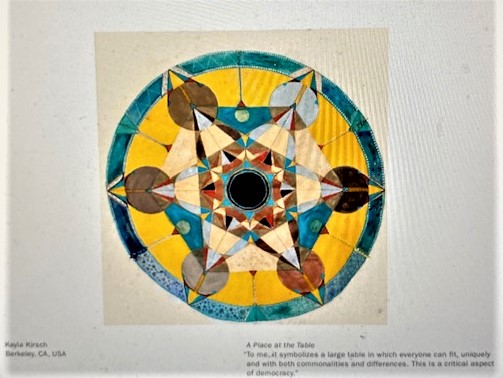
- A Place at the Table. “To me, it symbolizes a large table in which everyone can fit, uniquely and with both commonalities and differences. This is the critical aspect of democracy.” — by Kayla Kirsch, Berkeley, CA USA
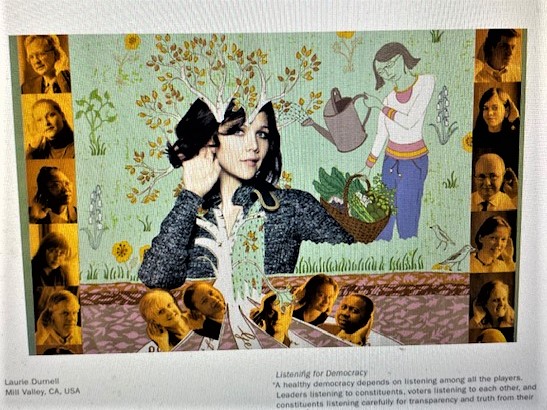
2. Listening for Democracy – “A healthy democracy depends in listening among all the players. Leaders listening to constituents, voters listening to each other, and constituents listening carefully for transparency and truth from their leaders.” — by Laurie Durnell, Mill Valley, CA USA
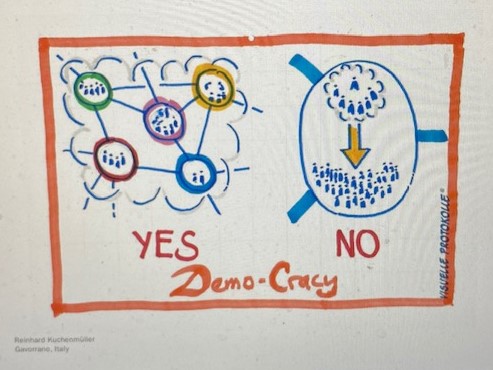
3. Image by Reinhard Kuchenmuller, Gavarrona, Italy
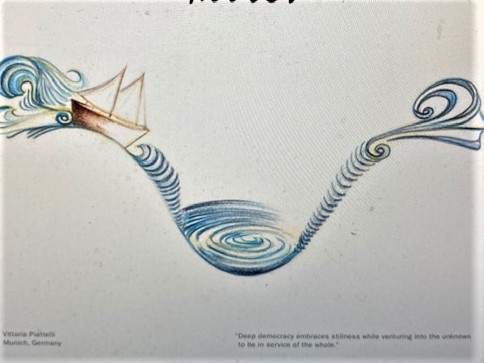
4. “Deep democracy embraces stillness while venturing into the unknown to be in service to the whole.” — by Vittoria Piatelli, Munich, Germany
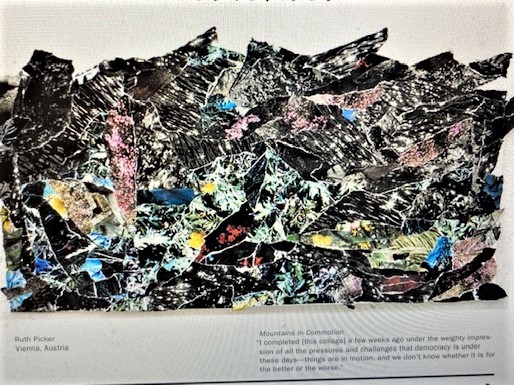
5. Mountains in Commotion. “I completed this collage a few weeks ago under the weighty impression of the pressures and challenges that democracy is under these days — things are in motion, and we don’t know whether it is for the better or for the worse.” — by Ruth Picker, Vienna, Austria
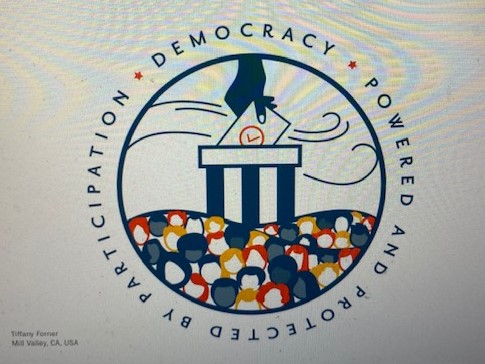
6. Powered and Protected by Participation — by Tiffany Forner, Mill Valley, CA USA
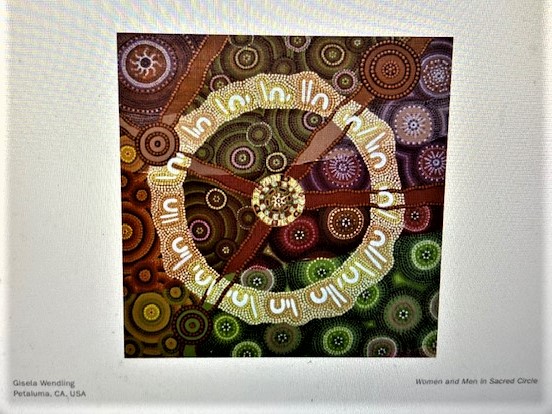
7. Women and Men in Sacred Circle — by Gisela Wendling, Petaluma, CA USA
CIRCLE ELEVEN — Democracy in Circles
How can we create a world where people are heard? How can we create a society that is more equal, fair, just, compassionate and loving? The circle might be a model to use to get us there.
Excerpt from Margaret Wheatley’s forward to the book, The Circle Way, A Leader in Every Chair, by Christina Baldwin
The world is made of circles – and we think in straight lines.
― Peter M. Senge
Vision from Black Elk, Oglala Sioux Medicine man
And I saw the sacred hoop of my people was one of many hoops that made one circle, wide as daylight and as starlight, and in the center grew one mighty flowering tree to shelter all the children of one mother and one father, and I saw that it was holy.
CIRCLE TWELVE — Audri Scott Williams
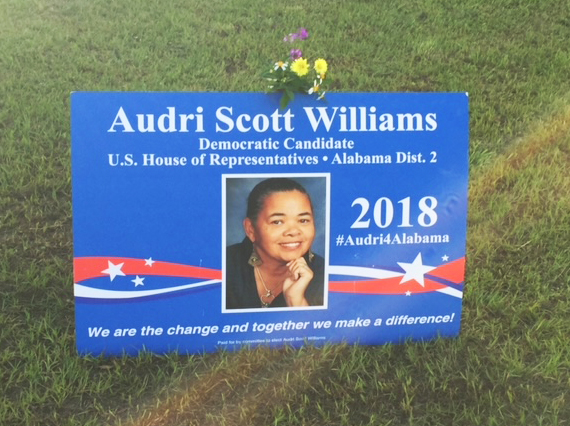
Trail of Dreams World Peace Walk and subsequent walks – we experienced people uniting who never thought they would come together. They came to care for one another. They knew they could make a difference.
Our campaign helpers included people who never thought of themselves playing a role in politics. Many came from homeless shelters. Our campaign office was intentionally in a rough part of town. We wanted to include people who had been treated as marginalized and invite them to help.
We need ancestors. We need people to lift our gaze and show us what is possible. This [uplift] helps unleash global innovation on many fronts….environment, women’s rights…
The experience in 1965 crossing the Edmund Pettus Bridge was an event that was a collective piercing of the veil…something that we could do as people of color. Amelia Boynton Robinson said that what gave her and the other marchers courage was that, “We knew we had already won. We had to be strong enough to carry it out.”
We are opening up the dream of democracy in a new way. Souls are gathering that know they can make a better world together.
We are waking up. What are we waking up to? Vaclav Havel said it (his quote)
Planetary democracy does not yet exist but our global civilization is already preparing a place for it. It is the very Earth we inhabit linked with Heaven above us. Only in this setting can the mutuality and the commonality of the human race be newly created with reverence and gratitude for that which transcends each of us and all of us together.
Democracy is breathing and growing in us. We are waking up both to the governance democracy requires and the participation. Each of us has it within us to envision the future. This path is leading us to transcendence.
At this time on the planet, we are living in a pressure cooker. The pressure can destroy us or it can also force us to find ways to release the pressure. We release the pressure, each one of us, by the choices we make.
As we walked the land of the Iroquois, carrying the fire was important. We were passing the fire. Passing it from the ancestors. We understood that light (fire) has to be nurtured, Oil needs replacement. That fire, the Spirit of light moving across five continents had power. That flame had power. When you carry the flame, the flame carries you.
The grandmothers have amazing love for the Earth. With this kind of love we can light the universe.
We acknowledge we are connected with a great mystical lineage. The four grandmothers were with me in my natality. This connects to deep foundations.
This [foundation] is what our political representatives must have. Like the representatives of the beginning nations – there must be listening where I am being guided and participating.
The new democracy asks us to own every part of ourselves and have the courage to live it out!
I am listening. I am watering the seeds. The seeds are the children, the youth. The seeds is our inner voice.
After you were cut off… Joanne read a quote from my democracy book, Thomas Paine p.103
We have the power to begin the world all over again. A situation similar to the present has not appeared since the days of Noah until now. The birth of a new world is at hand.
CIRCLE THIRTEEN — Dual Citizenship
Remembering my “dual citizenship” is not an effort to evade the world of human heartbreak. By understanding that I belong to a cosmos that has seen it all, embraced it all, and folded all of it into what is, I have a better chance to “see life steadily and see it whole” (and in the end, there is only one world).
When I can look at life that way, I’m better able to engage creatively with the here and now, neither crushed by a sense of inadequacy nor lost in fantasy.
Memo to Self: Linger on the last few lines of this William Stafford poem [below], where he describes the vastness in which you live. He calls it “this tranquil chaos that seems to be going somewhere, this wilderness of peacefulness, this motionless turmoil, this everything dance.”
Rooted in the serenity of that cosmic reality, return to the heartbreak of everyday life to contribute whatever you can to healing and peace.
From Robin Wall Kimmerer
From William Stafford
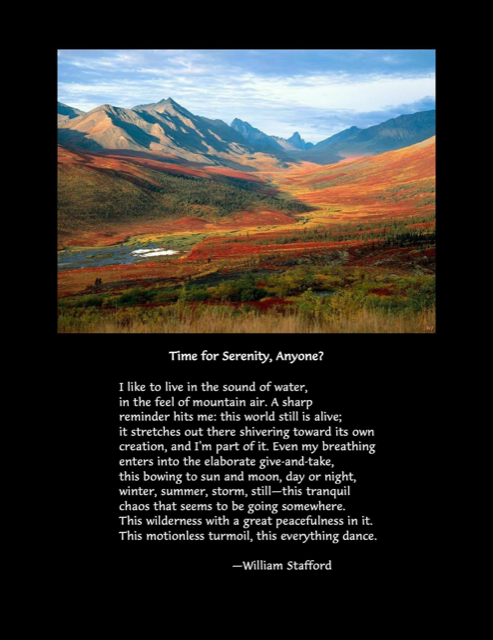
I like to live in the sound of water,
in the feel of mountain air. A sharp
reminder hits me: this world still is alive,
it stretches out there shivering toward its own
creation, and I’m part of it. Even my breathing
enters into this elaborate give-and-take,
this bowing to sun and moon, day or night,
winter, summer, storm, still — this tranquil
chaos that seem to be going somewhere.
This wilderness with a great peacefulness in it.
This motionless turmoil, this everything dance.
